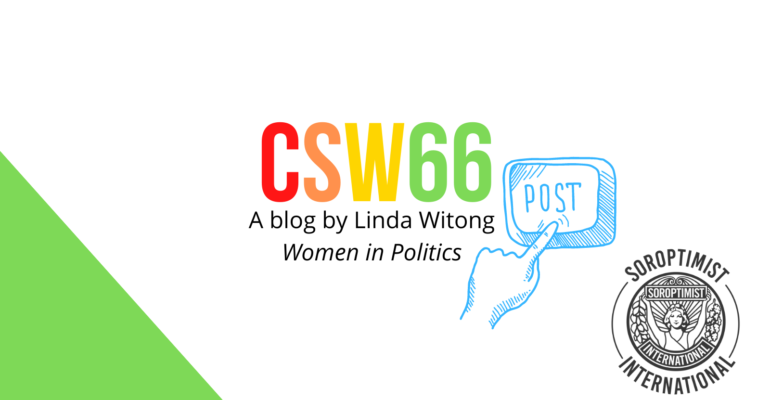A blog by Linda Witong
“Since the creation of the Convention on the Political Rights of Women, women have continued to fight to exercise their right to vote and hold office. But the path to achieving these goals has not been without many challenges. To begin with, during the CSW66 side virtual event entitled ‘The Role of Women’s Leadership and Gender-Responsive Parliaments in Climate Action’, the audience learned that women are still underrepresented in politics, parliaments, and public life. While women represent 49.6% of the world’s population, as of November 2021, women still made up only 25.9% of the parliamentarians around the world while men made up more than 74% leaving more than a 50% gender gap. While the gender percentage was a historic high, it was still far from gender parity. In addition, attitudes towards women candidates were still largely characterised by deeply ingrained stereotypes and political opponents would often rely on gender stereotypes to challenge women’s capacities to run for office or even when they were in office.
In addition to women being at the forefront of social movements demanding equal rights and more ambitious climate action, we have also learned that women’s participation in leadership is a crucial step towards achieving environmental goals globally and nationally. For example, a study which reviewed 91 countries determined that there was a strong positive correlation between the percentage of seats occupied by women in national parliaments and the prioritisation of climate change policy associated with lower CO2 emissions. Available research also indicated that the greater representation of women in national parliaments, the more likely it was that countries would adopt more “stringent climate change policies.” These policies were also more likely to succeed where women were placed in decision-making positions and had other factors, such as the country’s GDP per capita, education levels, and overall political orientation, present. Similar trends were also seen in environmental and disaster risk reduction policy areas.
Without placing more women in decision-making positions regarding climate change or disaster risk reduction, climate change would continue to reinforce harmful gender social norms and power dynamics that adversely impacted the role of women and girls in their everyday lives.

CSW66: ‘The Role of Women’s Leadership and Gender-Responsive Parliaments in Climate Action’.
However, this was not the only challenge that women met if they wished to enter the political arena. Mr. Abdulla Shahid, the President of the UN General Assembly, hosted an event at the 66th session of the Commission on the Status of Women, which dealt with how to address the violence against women in politics. Reem Alsalem, the UN Special Rapporteur on Violence against Women, described violence against women in politics “as an attempt to silence women as political actors and exclude them from political life”. Rather than being just another statistic, members of the audience brought this reality to life for the Commission by describing how violence had personally affected them before and during their political terms. The result? Ms. Alsalem observed that these attempts “threatened to offset the positive impact of measures adopted by states in different parts of the world to increase women’s representation, political parties, parliaments, and governments.” They also undermined women’s ability to participate fully in conflict resolution, peacebuilding processes, and nation-building” according to Ms. Alsalem.
During this session Member States also expressed concern about the role technology played in these cases, emphasising that social media platforms had to be responsible for combating hate speech against women in politics and improve their mechanisms in order to help tackle cyber violence against women. The EU Digital Services Act was praised as a recent example of legislation which criminalised cyber violence, including hate speech based on the grounds of sex or gender, as well as the non-consensual sharing of intimate images.
UN Women Executive Director Sima Bahous urged Member States to take concrete steps towards ensuring a safe environment for women to exercise their political will. Only when women are “safe from violence and accountability for crimes is ensured” would the world have “fairer, more inclusive and responsive decision-making”, and “be able to make progress on Agenda 2030”.

